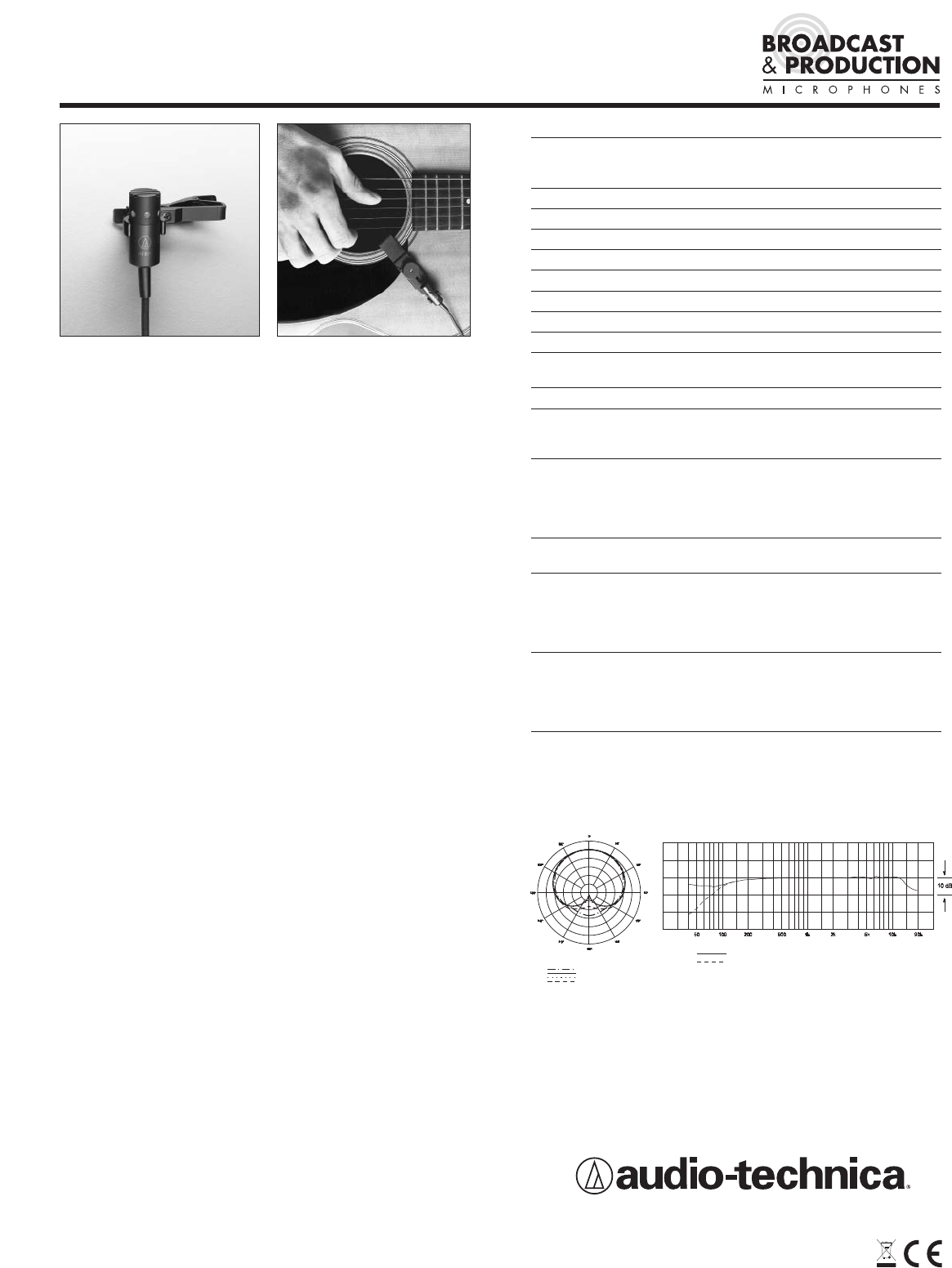
Audio-Technica U.S., Inc., 1221 Commerce Drive, Stow, Ohio 44224
Audio-Technica Limited, Old Lane, Leeds LS11 8AG England
www.audio-technica.com
P52049 ©2008 Audio-Technica U.S., Inc. Printed in Japan
SCALE IS 5 DECIBELS PER DIVISION
Polar Pattern
200 Hz
LEGEND
5 kHz
1 kHz
8 kHz
12" or more on axis
LEGEND
Roll-off
Frequency in Hertz
Frequency Response
Response in dB
• Clip-on lavalier mic provides crisp, full-sounding voice pickup
• Also excels as an instrument mic, especially for pickup of
acoustic guitar with included AT8444 instrument adapter
• Excellent gain before feedback and suppression of background
noise
• UniSteep
®
filter provides a steep low-frequency attenuation to
improve sound pickup without affecting voice quality
• Operates on phantom power only
For use as a lavalier, attach the microphone about six inches below
the chin. Anticipate movements that may cause the microphone to
rub against or be covered by clothing, and position the microphone
to avoid it.
The AT831R is intended for use in professional applications where
remote power is available. It requires 11 to 52V DC phantom power,
which may be provided by a mixer or console, or by a separate,
in-line source such as the Audio-Technica AT8801 single-channel
or CP8506 four-channel phantom power supplies.
Output from the power module’s XLRM-type connector is low
impedance (Lo-Z) balanced. The signal appears across Pins 2
and 3; Pin 1 is ground (shield). Output phase is “Pin 2 hot” –
positive acoustic pressure produces positive voltage at Pin 2.
To avoid phase cancellation and poor sound, all mic cables must
be wired consistently: Pin 1-to-Pin 1, etc.
An integral 80 Hz high-pass UniSteep
®
filter provides easy switching
from a flat frequency response to a low-end roll-off. The roll-off
position reduces the microphone’s sensitivity to popping in close
vocal use. It also reduces the pickup of low-frequency ambient
noise (such as traffic, air-handling systems, etc.), room reverberation
and mechanically coupled vibrations.
The microphone is RoHS compliant–free from all substances
specified in the EU directive on hazardous substances.
Avoid leaving the microphone in the open sun or in areas where
temperatures exceed 110° F (43° C) for extended periods.
Extremely high humidity should also be avoided.
AT831R SPECIFICATIONS
†
ELEMENT Fixed-charge back plate
permanently polarized
condenser
POLAR PATTERN Cardioid
FREQUENCY RESPONSE 40-16,000 Hz
LOW FREQUENCY ROLL-OFF 80 Hz, 18 dB/octave
OPEN CIRCUIT SENSITIVITY –42 dB (7.9 mV) re 1V at 1 Pa*
IMPEDANCE 250 ohms
MAXIMUM INPUT SOUND LEVEL 141 dB SPL, 1 kHz at 1% T.H.D.
DYNAMIC RANGE (typical) 112 dB, 1 kHz at Max SPL
SIGNAL-TO-NOISE RATIO
1
65 dB, 1 kHz at 1 Pa*
PHANTOM POWER 11-52V DC, 2 mA typical
REQUIREMENTS
SWITCH Flat, roll-off
WEIGHT (less cable and accessories)
MICROPHONE 2.8 g (0.1 oz)
POWER MODULE 81 g (2.9 oz)
DIMENSIONS
MICROPHONE 25.0 mm (0.98") long,
10.2 mm (0.40") diameter
POWER MODULE 92.9 mm (3.66") long,
18.9 mm (0.74") diameter
OUTPUT CONNECTOR Integral 3-pin XLRM-type
(power module)
CABLE 4.0 m (13.1') long (permanently
attached to microphone),
3.2 mm (0.13") diameter,
2-conductor, shielded cable with
TA3F-type connector
ACCESSORIES FURNISHED AT8538 power module;
AT8419 clothing clip;
AT8444 instrument adapter;
AT8116 windscreen;
protective carrying case
†
In the interest of standards development, A.T.U.S. offers full details on its test
methods to other industry professionals on request.
*1 Pascal = 10 dynes/cm
2
= 10 microbars = 94 dB SPL
1
Typical, A-weighted, using Audio Precision System One.
Specifications are subject to change without notice.
AT 8 31R
MINIATURE CARDIOID
CONDENSER MICROPHONE
